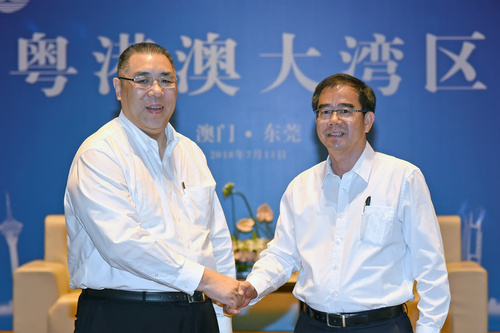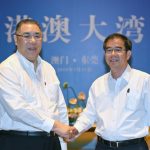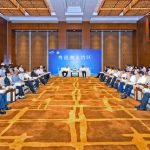 Chief Executive, Mr Chui Sai On, meets with the Secretary of CPC Dongguan Municipal Committee, Mr Liang Weidong, during his visit in Dongguan.
Chief Executive, Mr Chui Sai On, meets with the Secretary of CPC Dongguan Municipal Committee, Mr Liang Weidong, during his visit in Dongguan.
The Chief Executive, Mr Chui Sai On, concluded a tour of mainland cities in the Guangdong-Hong Kong-Macao Greater Bay Area (Greater Bay Area), on Wednesday (11 July) by leading a Macao delegation to Dongguan in Guangdong Province, to meet with the Secretary of the Communist Party of China (CPC) Dongguan Municipal Committee, Mr Liang Weidong. During the meeting, the two sides discussed issues related to industry, economic matters and trade, transportation, as well as cooperation in youth development. They voiced the belief that cooperation between the two cities would create unprecedented opportunities.
After being briefed about Dongguan by Mr Liang, the Chief Executive congratulated the city on its achievements, and expressed his hopes that Dongguan’s development would ascend to even higher levels. Mr Chui added he believed the Macao delegation’s visit would enable Macao to learn from Dongguan's successes, and to explore feasible opportunities for enhanced cooperation between the two cities.
Mr Liang briefed the Macao delegation about the latest data on Dongguan, including its land area, population and economic development. He said the city had experienced an upgrade and transformation during the past decade, leading to in-depth changes in the structure of its economy. As well as the high amount of added value created by its manufacturing industry, Dongguan ranked fifth among mainland China cities in terms of foreign trade.
He added that in the course of cooperation between Dongguan and Macao, more and more Macao enterprises – especially those led by young entrepreneurs – were investing in Dongguan, helping to forge a close relationship between both cities.
Mr Liang also gave four recommendations regarding further cooperation:
First, along with increased exchanges between places on the eastern shore and those on western shore of the Greater Bay Area, it was hoped that Macao could make use of its advantages to support the growth of Dongguan’s industry;
Second, there was room for development of import and export trade between Dongguan and Portuguese-speaking countries. Dongguan hoped to enhance cooperation by making use of Macao’s “Centre and Platform” polocies and its advantages under the Closer Economic Partnership Arrangement (CEPA) between Macao and the mainland. This would help support Dongguan enterprises in terms of exploring business potential in countries and places covered by the “Belt and Road” initiative. Mr Liang also noted Dongguan enjoyed the advantage of a deepwater harbour. He further observed that both cities could benefit by expanding the interpretation of relevant policies in order to make fresh use of Macao’s inherent advantages, and to help enterprises from Portuguese-speaking countries to establish businesses in the Pearl River Delta region;
Third, Dongguan and Macao could strengthen transport connectivity by launching ferry services between the two cities; and
Fourth, youth development work should be optimised. Young entrepreneurs from Macao were welcome to develop businesses in Dongguan, and the latter city was willing to create more favourable conditions and provide comprehensive support.
Finally, Mr Liang said he believed the Greater Bay Area initiative was a rare opportunity for Dongguan and Macao jointly to achieve unprecedented success.
Mr Chui said that the nine mainland China cities and two Special Administrative Regions that comprised the Greater Bay Area were eagerly awaiting the launch of the Outline Plan for the Development of the Guangdong-Hong Kong-Macao Greater Bay Area, and were considering how to implement such a plan.
The Chief Executive agreed that Mr Liang’s recommendations were worth considering, especially the development of ferry services between Dongguan and Macao, in order to relieve pressure on overland traffic. As many cities in the Pearl River Delta region were already served by ferry services to Macao, the suggestion merited serious consideration by the public departments concerned.
Mr Chui also invited Mr Liang to organise a delegation to Macao when appropriate, in order further to explore cooperation between corresponding departments.
Other people attending Wednesday’s meeting included: the Macao SAR Government’s Secretary for Administration and Justice, Ms Chan Hoi Fan; Executive Council spokesperson Mr Leong Heng Teng and Executive Council members Mr Liu Chak Wan, Mr Ma Iao Lai, Mr Cheang Chi Keong, Mr Chan Meng Kam, Ms Ho Sut Heng, and Mr Lam Kam Seng. Also in attendance were: the Chief-of-Office of the Chief Executive's Office, Ms O Lam; the Director of the Government Information Bureau, Mr Chan Chi Ping; the Director of the Protocol, Public Relations and External Affairs Office, Ms Lei Ut Mui; the Principal Advisor of the Policy Research Office, Mr Mi Jian; 15 members of the “Thousand Talents Union”; CPC Dongguan Municipal Committee standing committee member and Executive Vice Mayor of Dongguan, Mr Bai Tao; standing committee member and the Secretary of the Party Working Committee of the Songshan Lake Hi-Tech Industry Development Zone, Mr Huang Shaowen; and the Director of the Hong Kong and Macao Affairs Office, Guangdong Province, Mr LiaoJingshan.
Prior to the meeting with Mr Liang, Mr Chui and the delegation visited the Dongguan Songshan Lake Eco-city Science and Technology Centre at the Dongguan Eco-Industrial Park, and viewed the park’s exhibition hall. The visitors also attended a briefing on the project. The afternoon session in Dongguan concluded the Macao delegation’s tour of the final four among the nine mainland cities in the Greater Bay Area. The delegation then returned to Macao.
View gallery


